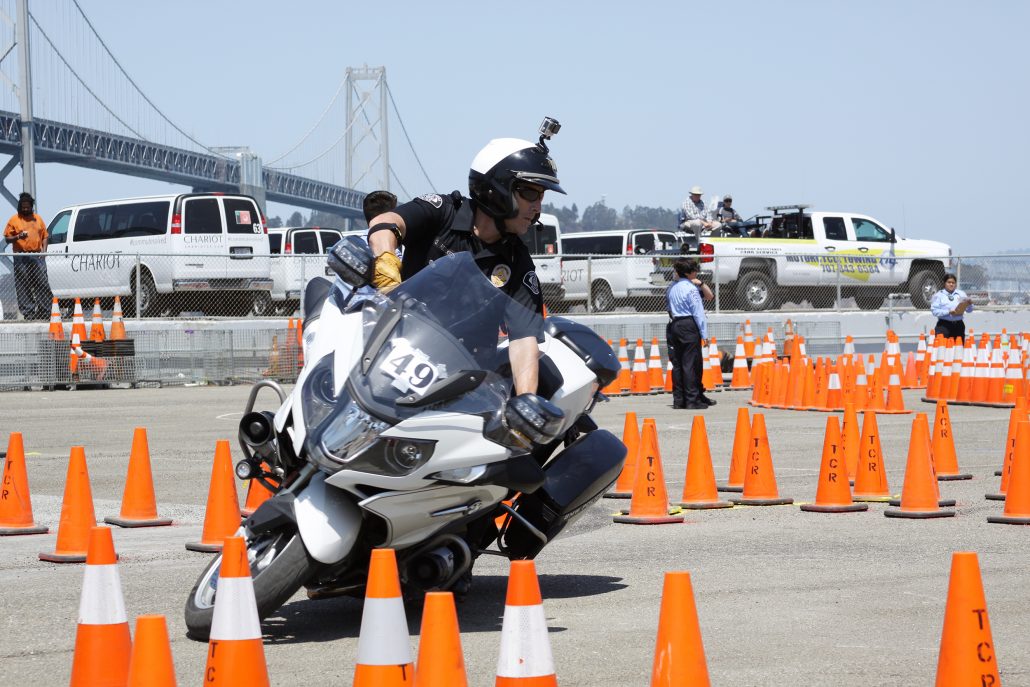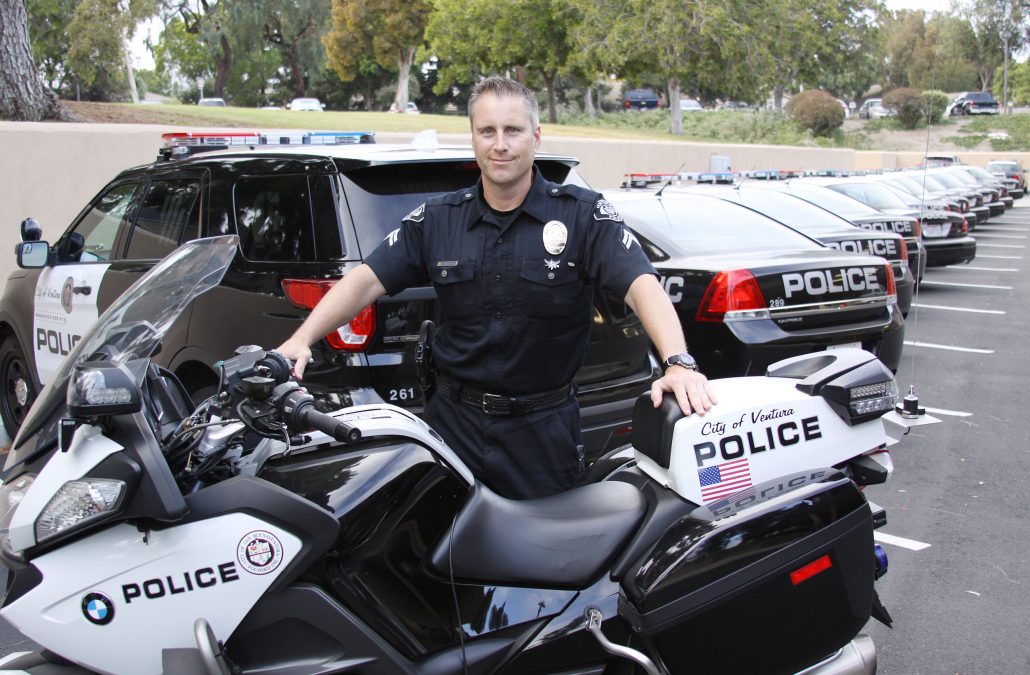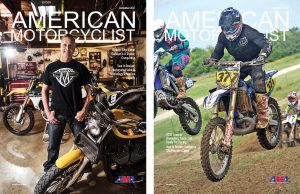American Motorcyclist December 2017
Well-Rounded Rider
Quinn Redeker Jr. On Precision Competition, Dirt Bikes, Vintage Racing
By Jim Witters
Quinn Redeker Jr. got the urge to ride motorcycles as a child and has taken advantage of every opportunity to ride since the age of 9.
“My big brother was planning on getting into motocross and talked about it often, so I imagine my first interest developed from that,” Redeker said.
With nearly 40 years of experience, Redeker, now 48, has ridden dirt bikes, street bikes, vintage bikes and police motorcycles, sometimes for fun, but many times in competitions.
He has served as a motorcycle training officer for the Ventura Police Department, where he now is a detective supervisor in the Special Victim’s Unit.
His expert control of motorcycles has been evident in police skills competitions.
Of all the events he’s entered, he says he “failed to take first in maybe three of them,” he said. “But understand that there were a small handful of guys who never failed to keep me honest at just about all of those events.”
Redeker shared some of his experiences with American Motorcyclist.
American Motorcyclist: When did you start riding motorcycles?
Quinn Redeker: I started riding at age 9. I grew up in southern California in the late ’70s and early ’80s. I played drums and rode dirt bikes. Not much else mattered back then.
AM: What was your first bike?
QR: My first bike was a Honda XR80. My dad got it for my birthday. I used to stare at the brochure for hours, imagining all the excitement I was going to have. Then I got it and rode it every single day on the hills behind my house. I never checked the nuts or bolts, never cleaned the air filter or adjusted the chain. The tires were bald and almost flat. But, to this day, it was the best time I ever had on a motorcycle.
My current stable: 2017 Husky 501, 2016 Yamaha YZ450F, 2009 Harley 1200, 1980 Yamaha YZ250.
AM: What do you ride now?
QR: I don’t ride police bikes for enforcement at this time. However, I still do instruction on them. Both with Ventura Police Department and with Lee Parks’ Total Control Program, I help train the trainers to make them better at slower speed motorcycle technique.
Lee Parks is an amazing positive force and is doing great things in the furtherance of motorcycle safety. I absolutely applaud his program and appreciate being associated with it.
My current stable: 2017 Husky 501, 2016 Yamaha YZ450F, 2009 Harley 1200, 1980 Yamaha YZ250.
AM: What was your previous job?
QR: I used to be both a national and international sales manager for a large cosmetic manufacturing company out of Los Angeles. I spent most of my years running around the globe, taking power lunches and living out of a suitcase.
It paid well, but I started wondering what mark I was leaving in the relatively short time I have here. It bothered me.
So, one day, without any job prospects on the horizon, I quit. I had money saved, so I just went running at the beach with my dogs every day for a few months and thought about things.
Eventually I decided to submit an application to the Ventura Police Department. I was a bit older than average, but I was a triathlete at the time and knew how to shoot, so I figured it would all work out.
Since then I have been blessed with amazingly talented friends to help guide and support me at the department.
AM: How long have you been a police officer?
QR: Coming up on 12 years. In that time, I have been given the opportunity to join our SWAT Team as a sniper, an emergency driving instructor and firearms instructor, among other collateral assignments. The practical knowledge and personal growth from my additional areas of responsibility have absolutely contributed to my overall sense of self-worth. Plus it makes me sound like I must really know what I’m doing!

Photo by Greg Drevenstedt
AM: What inspired you to begin competing in the motorcycle skills competitions?
QR: After “Motor School,” I heard about these events police officers competed in, using their department motorcycles, for training and bragging rights. Having grown up racing motorcycles, it sounded like a great way to justify my wasted youth as a dirt bike racer!
My girlfriend at the time, now wife, went with me and we had fun, but more importantly my sergeant was extremely supportive and allowed me to continue to go and compete. That really made all the difference in the world.
AM: How many events have you entered?
QR: Maybe around 100 or so. Some were larger events, maybe 150 riders. Others were small, maybe 20 riders. It didn’t matter, though, because the fast guys went to all of them. So, it usually came down to the same four or five guys, no matter what.
AM: How did your first competition go?
QR: At the first event, I ran the fastest “raw” time of the day, before penalties for hitting cones.
While I was the “fastest,” I think I ended up fourth or fifth, at best. As time went on, I learned to pay attention to riding fast, but clean, never touching a traffic cone.
My first event was nerve racking. There were plenty of good riders out there hauling the mail, so I tried to go fast and beat everybody, but got killed in penalties.
Guys who compete regularly know how to stay calm and run fast. I got a good lesson that day.
AM: What are your competitors like?
QR: Some of my competitors had backgrounds in AMA professional motocross, road racing and dirt track. These guys were no joke. And, to be honest, I was often bewildered as to how it was that I could go faster than they did. I have great respect and admiration for those guys. Funny enough, however, a small, few, extremely talented guys had very little riding experience prior to police motorcycle enforcement, but they flew on a police motorcycle.
AM: Do you still compete?
QR: Not in police motor competitions. I have been racing vintage motocross in a local club on and off when I get the time. I hit the trails and track as often as I can.
AM: What do you get out of the competition, other than trophies?
QR: Added skill. If you take an average motor officer straight out of motor school, s/he will be a solid rider. But if you plug that officer into a series of motor competitions for a season, they will excel in all aspects of riding: accelerating, braking, rapid direction changes, handling stress in an emergency situation.
AM: What makes you so successful in competition?
QR: I think it’s a combination of things. I’ve been a drummer since I was 7, and I think the coordination required to play drums translates into all the subtle inputs required to ride a motorcycle well.
That said, I have spent plenty of years riding various types of motorcycles, from Harleys to trials bikes, and everything in between. I feel like I have a decent ability to focus on the little idiosyncrasies communicated to me by the motorcycle, then I make small adjustments and continue the process of evaluation and adjustment. That, and I really hate losing.
AM: Do the skills needed to compete in these police events translate to better street or dirt riding?
QR: Any riding you do, no matter what it is, will translate into better practical ability on the street or off road. The primary benefit in mastering law enforcement riding is figuring out the role the clutch plays. Specifically, riding like a cop requires that you learn how to use the clutch in a partially engaged state most of the time, “slipping” it. While it is unusual at first, after you get comfortable and proficient at it, all slower speed situations on any type of motorcycle become much easier to deal with.
AMA is motorcycling, whether you ride or race. The AMA is alive and well, educating me and fighting for a cause that I care about.
AM: When did you join the AMA?
QR: I joined around 2007, when my girlfriend, now wife, got me a membership for my birthday. Then and there, I knew she was a keeper, and so, too, was my membership. I purchased a new BMW R12S around that time and started riding street bikes again. I liked the security of the benefits associated with the AMA, along with the cool magazine articles I got to read once I was a member!
AMA is motorcycling, whether you ride or race. The AMA is alive and well, educating me and fighting for a cause that I care about.
AM: What makes you a good police officer?
QR: Ha! Well, I’d be more comfortable giving you my opinion of the ingredients that make a good police officer.
These would include the legal knowledge of an attorney, the medical know-how of a doctor, the compassion of a social worker, the instincts of a psychic, the patience of Gandhi, the orating skills of a preacher and the physical abilities of Chuck Norris.
While I’m being facetious, the public expectation is not far off. And, in the end, a good cop can’t be good at any one thing. You can’t be great at weapons and tactics, but a poor communicator. Or book-smart but not street-wise.
This job demands that you have the ability to do it all at different times of the day. Therein lies the blessing and the curse of this profession.

Photo by Greg Drevenstedt
AM: What else would like to convey?
QR: To the person reading this article, you and I actually have plenty in common.
Like you, I’m infected with this disease called motorcycles.
I grew up loving it, talking about it, dreaming about it, convincing my parents about it, saving money up for it and filling a life up with it.
Next time we see each other, give me a wave and a nod, and I’ll wave back.
In that exchange, we will participate in and appreciate the commonality between us all: motorcycles.

